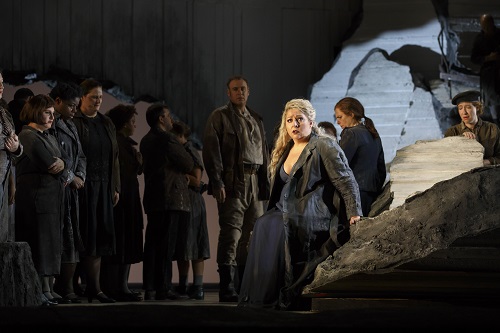 United States Berlioz, Les Troyens: Soloists, Lyric Opera of Chicago / Sir Andrew Davis (conductor), Civic Opera House, Chicago. 13.11.2016. (JLZ)
United States Berlioz, Les Troyens: Soloists, Lyric Opera of Chicago / Sir Andrew Davis (conductor), Civic Opera House, Chicago. 13.11.2016. (JLZ)

Cast:
Cassandre – Christine Goerke
Didon – Susan Graham
Énée – Brandon Jovanovich
Chorèbe – Lucas Meachem
Narbal – Christian Van Horn
Anna – Okka von der Damerau
Iopas – Mingjie Lei
Ascanius – Annie Rosen
Panthus – Philip Horst
Hylas – Jonathan Johnson
Greek Captain – Patrick Guetti
Bradley Smoak – Ghost of Hector
David Govertsen – Priam
Catherin Martin – Hecuba
Helenus – Corey Bix
Production:
Director – Tim Albery
Designer – Tobias Hoheisel
Lighting Designer – David Finn
Chorus Master – Michael Black
Choreographer – Helen Pickett
A country in a years-long war, enemies within its gates, its famed towers collapsing, and its fate in the hands of inept leaders, the response of the public to roles of women—these and other themes in Les Troyens resonate across the centuries since Berlioz completed this opera over 150 years ago. Lyric Opera of Chicago’s version of this epic is all the more relevant for today’s audiences in this new, modern-dress production based on Hugh McDonald’s critical edition. The result is a theatrical powerful experience, with musical, dramatic, and literary elements merging successfully. Yet the production never loses sight of Berlioz’s humanity.
In the first part, “The Taking of Troy,” Christine Goerke commanded the stage as Cassandra, her prophetic visions unheeded by the Trojan people, her family, and even her lover Chorèbe. Goerke’s impassioned performance—with pitch-perfect tone and impeccable diction—commanded the stage from beginning to end. Goerke’s interpretation brought out her passion for Chorèbe (Lucas Meachem), making the tragedy even more profound, as she expressing her vision of the fate ahead for Troy. Goerke exhibited welcome intimacy in her interactions with Meacham, who responded ardently with focus and a supple baritone. The two singers dominated Act I with their elegance and acumen.
But it is the chorus that frames each part, with finely-hued timbres, and Michael Black’s careful preparation was evident, encouraging the group to deploy subtle shifts in timbre and intensity.
Esteemed internationally for her portrayals of Dido, Susan Graham delivered polished sound, precise diction, and dramatic gifts. She was especially moving and seamless in the intimate duet with the stellar Okka von der Damerau (following her Erda in Das Rheingold) as Dido’s sister Anna.
As Aeneas, Brandon Jovanovich was outstanding on all counts, in a tour-de-force with ease and confidence, and energy that never flagged. In Act IV, he matched Graham well in the extended duet scene, a welcome point of repose.
As Hylas, Jonathan Johnson sang his Act V opening with beauty, presaging the final duet with Graham and Jovanovich at their best. As Dido’s deep love transforms into equally profound hatred, her curse on Aeneas and the nascent Roman nation shifts from the personal to epic, and Grahams consummate style triumphed in the final scene.
The production met the musical demands with remarkable stagecraft. A projected shadow of the famed Trojan horse was more effective than any physical prop. Likewise, the rotating, broken semi-circle of a wall suggested both cities, Troy and Carthage. In the finale, flames suggested violence that would accompany the strife with Rome, accompanied by the word “Roma” emblazoned on the stage just before the curtain fell.
Under the baton of Sir Andrew Davis, the production brings Lyric to a new level of accomplishment, presenting Berlioz’s masterpiece with stylish grace and dramatic élan.
James L. Zychowicz